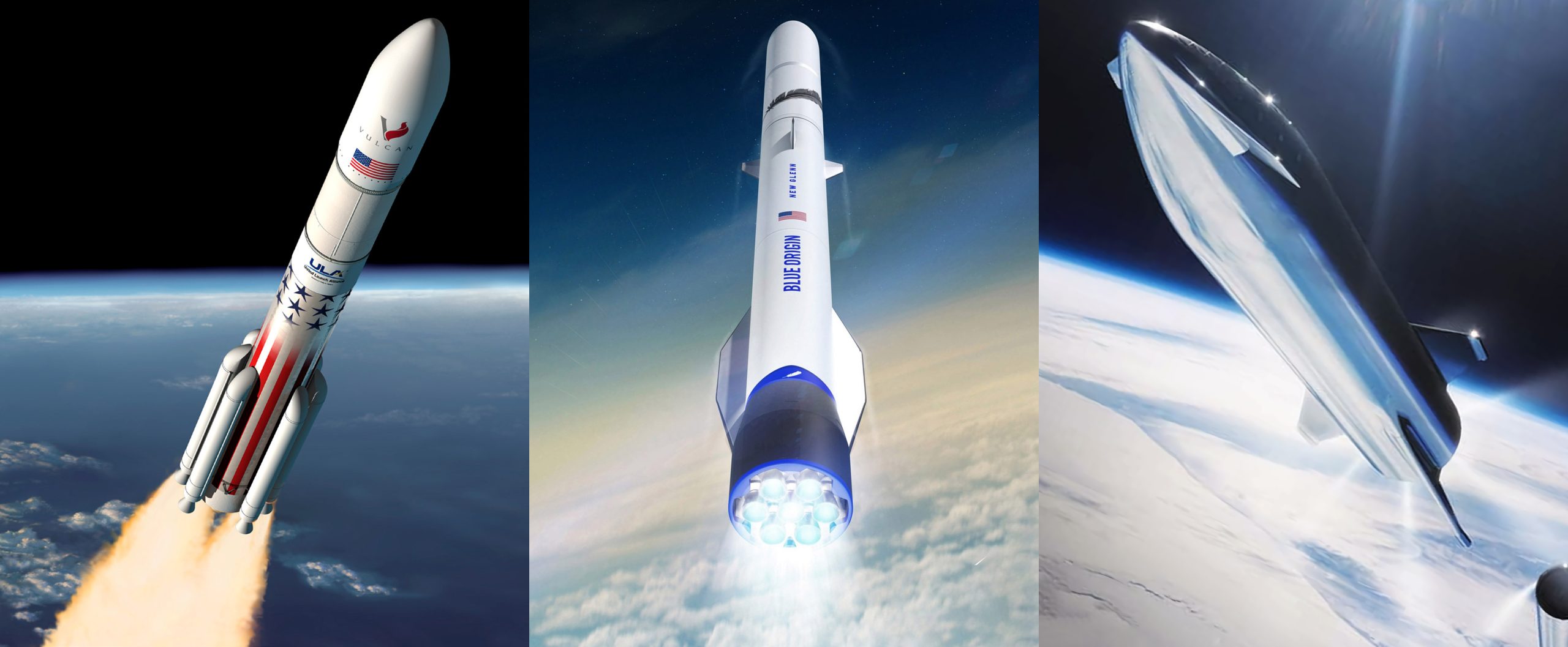
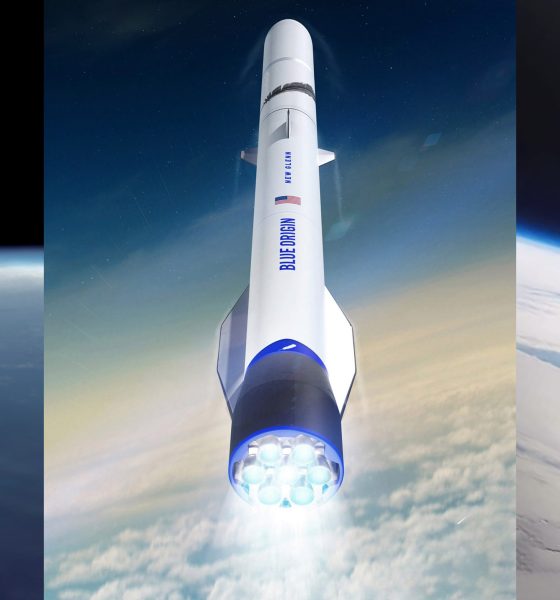
News
SpaceX COO offers harsh critique of Falcon 9, Starlink, and Starship’s competitors
SpaceX President Gwynne Shotwell says that the company’s Starlink internet constellation is years ahead of competition from OneWeb and Amazon. A step further, the executive also voiced several unprecedently harsh critiques of Jeff Bezos’ Blue Origin and Boeing and Lockheed Martin (ULA).
SpaceX President and Chief Operating Officer Gwynne Shotwell has been as busy as ever and has attended numerous major events over the last few weeks, often speaking with an unprecedented level of candor. The famous SpaceX executive repeatedly indicated that competitors have over-promised and under-delivered and, as a result, are years behind SpaceX’s own Starlink constellation. SpaceX has already launched 60 prototype satellites and has hundreds more on the way as part of a bid to kick off a busy period of “v1.0” satellite.
SpaceX intends to launch has many as 24 dedicated Starlink missions next year, equating to 60 satellites launched every two or so weeks. Meanwhile, the company is in the late stages of preparing to mass-produce “user terminals” and ground stations with the hope of delivering internet service to customers internet as early as mid-2020.
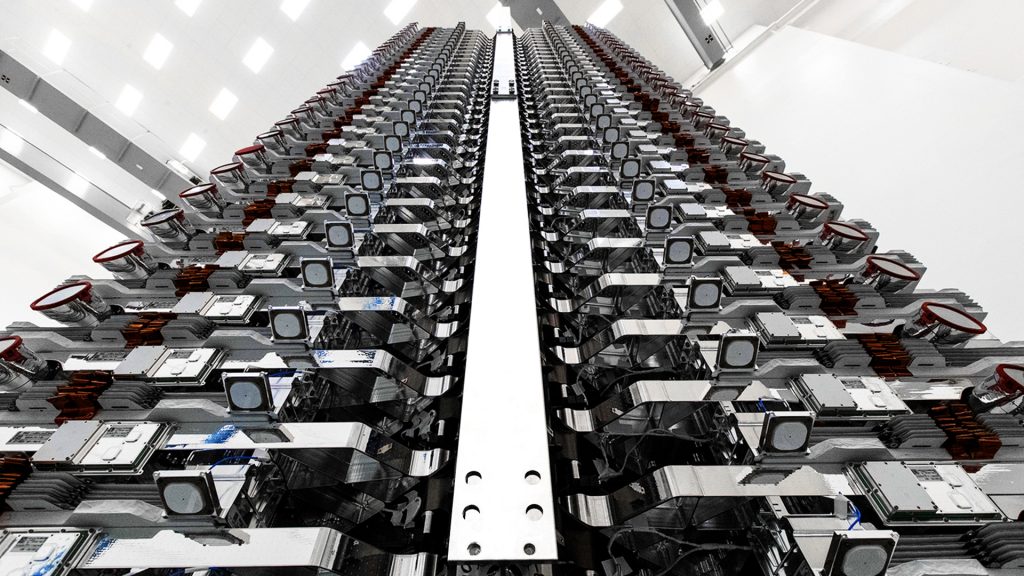
Starlink, OneWeb, and Project Kuiper
Shotwell was especially critical of megaconstellation competitors OneWeb and Amazon, the latter of which began hiring just a few months ago for a several-thousand-satellite constellation known as Project Kuiper. During an October 25th Q&A session with billionaire Ron Baron at the Baron Fund’s annual Investment Conference, Shotwell was uncharacteristically candid about the spaceflight industry outside of SpaceX’s doors, pointing to Jeff Bezos’s Blue Origin and the United Launch Alliance as prime examples of the many pitfalls of traditional aerospace methods.
Shotwell, on SpaceX's competitors and why other companies haven't built and landed orbital rockets: "Boeing and Lockheed like their cushy situation."— Michael Sheetz (@thesheetztweetz) October 25, 2019
She responded by crediting the hard work of SpaceX engineers and the often ambitious timelines set forth by company CEO Elon Musk, stating that, “I don’t think there’s a motivation or a drive there.” She explained that she believes that “engineers think better when they’re pushed hardest to do great things in a very short period of time, with very few resources. Not when you have twenty years.” This is a bit of a brutal take given that SpaceX is infamous for offering an often brutally hostile work environment and some of the worst salaries in the industry, but it’s nearly impossible to deny that SpaceX’s list of achievements is essentially unrivaled.
Baron: Why hasn't Bezos been doing this? He's spending lots of money.
Shotwell: They're two years older than us and they've yet to reach orbit. They get $1 billion of "free money" each year but I think engineers work better when they're pushed.— Michael Sheetz (@thesheetztweetz) October 25, 2019
Discussing Blue Origin, Shotwell pulled no punches, stating that “they’ve got a ton of money and they’re not doing a lot.” While both companies – SpaceX and Blue Origin – have remained private and exist in large part thanks to their wealthy owners, SpaceX has pursued commercial relevance and become wildly successful. On the other hand, Blue Origin – despite being two years older – would likely lose all forward momentum or fold outright if owner Jeff Bezos were to cease bankrolling the spaceflight company.
Blue Origin is currently developing a large, reusable, orbital-class rocket known as New Glenn and could eventually become SpaceX’s only serious competition, but the rocket’s first launch is unlikely to occur before H2 2021 or 2022.
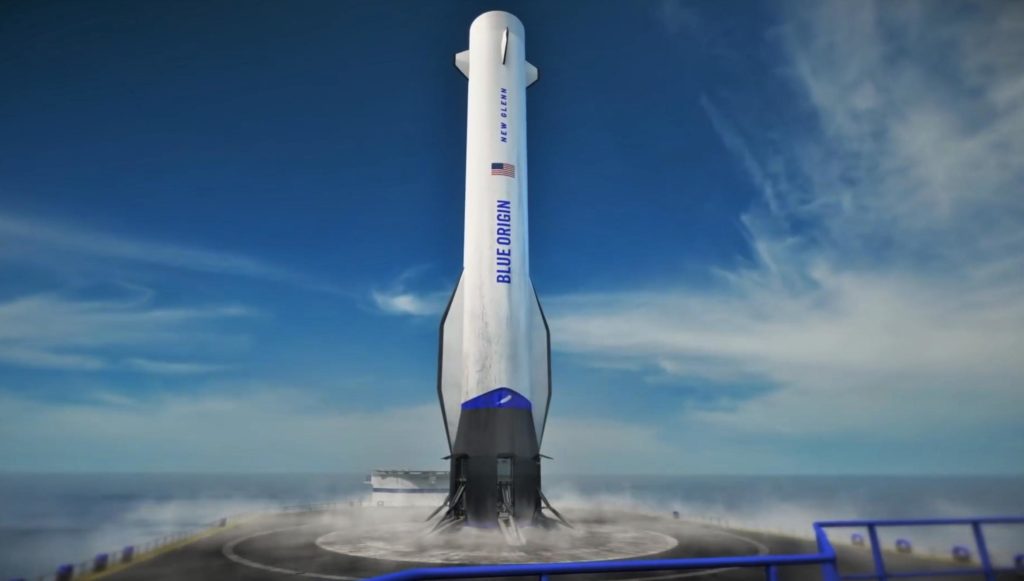
Simultaneously, Amazon recently revealed Project Kuiper, a slightly modified version of SpaceX’s Starlink constellation that is being lead by ex-Starlink executives fired by Elon Musk in June 2018. Project Kuiper, however, has only just begun and is likely at least 3-5 years away from beginning orbital testing, let alone providing any sort of service to customers.
Shotwell also addressed a new competitor in the large-scale satellite constellation market, OneWeb. During her talk with Baron, Shotwell bluntly warned potential investors to steer clear of the company. She boasted about SpaceX’s Starlink satellites, stating that they are “17 times better per bit”, a reference to Starlink’s greater per-satellite bandwidth, and cautioned that “if you’re thinking about investing in OneWeb, I would recommend strongly against it. They fooled some people who are going to be pretty disappointed in the near term.”
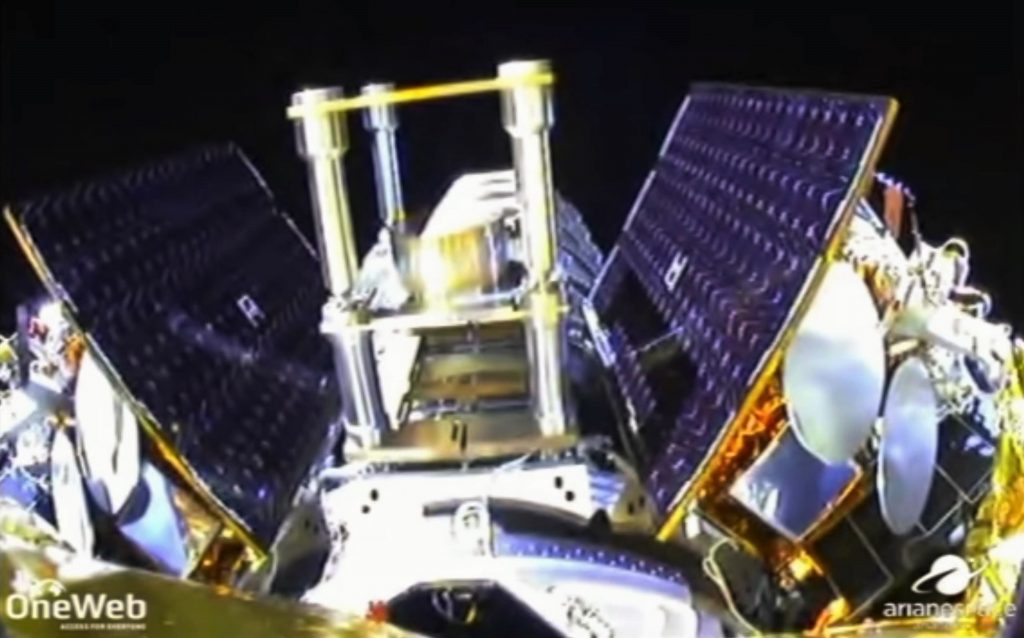
OneWeb later provided a follow up to CNBC reporter Michael Sheetz stating “we are not in the business of commenting on competitors. OneWeb’s satellites and constellation design are tested, market leading and we are excited to start our monthly launches soon and to start delivering much needed connectivity to people everywhere.” In reality, OneWeb and executives like Greg Wyler comment on competitors all the time, they just rarely put all their cards on the table.
Regardless, Shotwell’s streak of candor appears to have no end in sight. It remains to be seen whether her move towards uncharacteristically vitriolic public comments is a smart strategy, but she is undoubtedly making waves.
Check out Teslarati’s Marketplace! We offer Tesla accessories, including for the Tesla Cybertruck and Tesla Model 3.

News
Tesla wins another award critics will absolutely despise
Tesla earned an overall score of 49 percent, up 6 percentage points from the previous year, widening its lead over second-place Ford (45 percent, up 2 points) to a commanding 4-percentage-point gap. The company also excelled in the Fossil Free & Environment category with a 50 percent score, reflecting strong progress in reducing emissions and decarbonizing operations.

Tesla just won another award that critics will absolutely despise, as it has been recognized once again as the company with the most sustainable supply chain.
Tesla has once again proven its critics wrong, securing the number one spot on the 2026 Lead the Charge Auto Supply Chain Leaderboard for the second consecutive year, Lead the Charge rankings show.
NEWS: Tesla ranked 1st on supply chain sustainability in the 2026 Lead the Charge auto/EV supply chain scorecard.
“@Tesla remains the top performing automaker of the Leaderboard for the second year running, and increased its overall score by 6 percentage points, while Ford only… pic.twitter.com/nAgGOIrGFS
— Sawyer Merritt (@SawyerMerritt) March 4, 2026
This independent ranking, produced by a coalition of environmental, human rights, and investor groups including the Sierra Club, Transport & Environment, and others, evaluates 18 major automakers on their efforts to build equitable, sustainable, and fossil-free supply chains for electric vehicles.
Tesla earned an overall score of 49 percent, up 6 percentage points from the previous year, widening its lead over second-place Ford (45 percent, up 2 points) to a commanding 4-percentage-point gap. The company also excelled in the Fossil Free & Environment category with a 50 percent score, reflecting strong progress in reducing emissions and decarbonizing operations.
Perhaps the most impressive achievement came in the batteries subsection, where Tesla posted a massive +20-point jump to reach 51 percent, becoming the first automaker ever to surpass 50 percent in this critical area.
Tesla achieved this milestone through transparency, fully disclosing Scope 3 emissions breakdowns for battery cell production and key materials like lithium, nickel, cobalt, and graphite.
The company also requires suppliers to conduct due diligence aligned with OECD guidelines on responsible sourcing, which it has mentioned in past Impact Reports.
While Tesla leads comfortably in climate and environmental performance, it scores 48 percent in human rights and responsible sourcing, slightly behind Ford’s 49 percent.
The company made notable gains in workers’ rights remedies, but has room to improve on issues like Indigenous Peoples’ rights.
Overall, the leaderboard highlights that a core group of leaders, Tesla, Ford, Volvo, Mercedes, and Volkswagen, are advancing twice as fast as their peers, proving that cleaner, more ethical EV supply chains are not just possible but already underway.
For Tesla detractors who claim EVs aren’t truly green or that the company cuts corners, this recognition from sustainability-focused NGOs delivers a powerful rebuttal.
Tesla’s vertical integration, direct supplier contracts, low-carbon material agreements (like its North American aluminum deal with emissions under 2kg CO₂e per kg), and raw materials reporting continue to set the industry standard.
As the world races toward electrification, Tesla isn’t just building cars; it’s building a more responsible future.
News
Tesla Full Self-Driving likely to expand to yet another Asian country
“We are aiming for implementation in 2026. [We are] doing everything in our power [to achieve this],” Richi Hashimoto, president of Tesla’s Japanese subsidiary, said.

Tesla Full Self-Driving is likely to expand to yet another Asian country, as one country seems primed for the suite to head to it for the first time.
The launch of Full Self-Driving in yet another country this year would be a major breakthrough for Tesla as it continues to expand the driver-assistance program across the world. Bureaucratic red tape has held up a lot of its efforts, but things are looking up in some regions.
Tesla is poised to transform Japan’s roads with Full Self-Driving (FSD) technology by 2026.
Richi Hashimoto, president of Tesla’s Japanese subsidiary, announced the ambitious timeline, building on successful employee test drives that began in 2025 and earned positive media reviews. Test drives, initially limited to the Model 3 since August 2025, expanded to the Model Y on March 5.
Once regulators approve, Over-the-Air (OTA) software updates could activate FSD across roughly 40,000 Teslas already on Japanese roads. Japan’s orderly traffic and strict safety culture make it an ideal testing ground for autonomous driving.
Hashimoto said:
“We are aiming for implementation in 2026. [We are] doing everything in our power [to achieve this].”
The push aligns with Hashimoto’s leadership, which has been credited for Tesla’s sales turnaround.
In 2025, Tesla delivered a record 10,600 vehicles in Japan — a nearly 90% jump from the prior year and the first time exceeding 10,000 units annually.
BREAKING 🇯🇵 FSD IS LIKELY LAUNCHING IN JAPAN IN 2026 🚨
Richi Hashimoto, President of Tesla’s Japanese subsidiary, stated: “We are aiming for implementation in 2026” and added that they are “doing everything in our power” to achieve this 🔥
Test drives in Japan began in August… pic.twitter.com/jkkrJLszXN
— Ming (@tslaming) March 5, 2026
The strategy shifted from online-only sales to adding 29 physical showrooms in high-traffic malls, plus staff training and attractive financing offers launched in January 2026. Tesla also plans to expand its Supercharger network to over 1,000 points by 2027, boosting accessibility.
This Japanese momentum reflects Tesla’s broader international expansion. In Europe, Giga Berlin produced more than 200,000 vehicles in 2025 despite a temporary halt, supplying over 30 markets with plans for sequential production growth in 2026 and battery cell manufacturing by 2027.
While regional EV sales faced headwinds, the factory remains a cornerstone for Model Y deliveries across the continent.
In Asia, Giga Shanghai continues to be recognized as Tesla’s powerhouse. China, the company’s largest market, saw January 2026 deliveries from the plant rise 9 percent year-over-year to 69,129 units, with affordable new models expected later this year.
FSD advancements, already progressing in the U.S. and South Korea, are slated for Europe and further Asian rollout, complementing plans to expand Cybercab and Optimus to new markets as well.
With OTA-enabled autonomy on the horizon and retail strategies paying dividends, Tesla is strengthening its footprint from Tokyo showrooms to Berlin assembly lines and Shanghai exports. As Hashimoto continues to push Tesla forward in Japan, the company’s global vision for sustainable, self-driving mobility gains traction across Europe and Asia.
News
Tesla ships out update that brings massive change to two big features
“This change only updates the name of certain features and text in your vehicle,” the company wrote in Release Notes for the update, “and does not change the way your features behave.”

Tesla has shipped out an update for its vehicles that was caused specifically by a California lawsuit that threatened the company’s ability to sell cars because of how it named its driver assistance suite.
Tesla shipped out Software Update 2026.2.9 starting last week; we received it already, and it only brings a few minor changes, mostly related to how things are referenced.
“This change only updates the name of certain features and text in your vehicle,” the company wrote in Release Notes for the update, “and does not change the way your features behave.”
The following changes came to Tesla vehicles in the update:
- Navigate on Autopilot has now been renamed to Navigate on Autosteer
- FSD Computer has been renamed to AI Computer
Tesla faced a 30-day sales suspension in California after the state’s Department of Motor Vehicles stated the company had to come into compliance regarding the marketing of its automated driving features.
The agency confirmed on February 18 that it had taken a “corrective action” to resolve the issue. That corrective action was renaming certain parts of its ADAS.
Tesla discontinued its standalone Autopilot offering in January and ramped up the marketing of Full Self-Driving Supervised. Tesla had said on X that the issue with naming “was a ‘consumer protection’ order about the use of the term ‘Autopilot’ in a case where not one single customer came forward to say there’s a problem.”
This was a “consumer protection” order about the use of the term “Autopilot” in a case where not one single customer came forward to say there’s a problem.
Sales in California will continue uninterrupted.
— Tesla North America (@tesla_na) December 17, 2025
It is now compliant with the wishes of the California DMV, and we’re all dealing with it now.
This was the first primary dispute over the terminology of Full Self-Driving, but it has undergone some scrutiny at the federal level, as some government officials have claimed the suite has “deceptive” names. Previous Transportation Secretary Pete Buttigieg was one of those federal-level employees who had an issue with the names “Autopilot” and “Full Self-Driving.”
Tesla sued the California DMV over the ruling last week.








